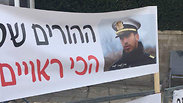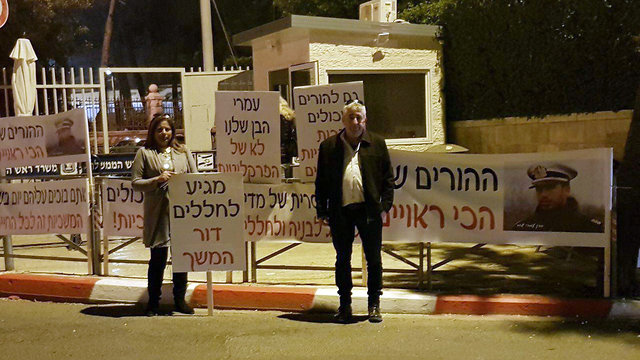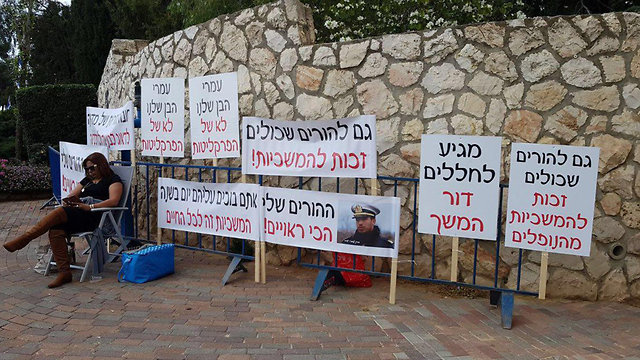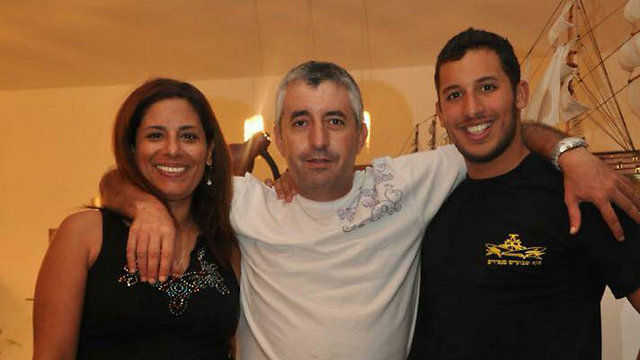
Bereaved parents urge PM to allow them to use son's semen
Parents of Navy Ofc. Omri Shahar killed in 2012 car accident are protesting legal decision preventing them from using his semen to produce grandson through surrogacy: 'Bereaved parents deserve right to continuity'; precedent in China: baby born four years after his parents died in accident.
Fallen IDF soldier Omri Shahar's parents, Asher and Irit, protested demanding to change the state's verdict, and allow them to use the sperm to create a new generation.
Omri, A naval officer, was killed in June, 2012 on his way back to base in a car accident together with officer Refael Bublil. Omri was their eldest son, and brother to Inbar—who recently gave birth herself—and Lotem.
Prior to his burial, Omri's parents decided to draw sperm from his body. Six months later, they petitioned the state to use his sperm for the creation of a new generation, but the state objected. Omri's parents have been fighting the courts for four years to get the state's permission to create life from their son's sperm.
The Magistrates’ Court in Petah Tikva had finally accepted their petition, but the state submitted an appeal and the District Court in Lod ruled in favor of the state. Recently, the parents tried to appeal the district court's decision to the Supreme Court, but they allege Justice Menachem Mazuz refused to discuss their appeal.
This week they demonstrated in front of Netanyahu's residence in the hopes of somebody understanding and helping them. "I'm demonstrating over the deceased's right to bear children and want this matter to be legislated," said Omri's mother. "Time has come for the state not to send its bereaved parents to the courts, where they fritter away time and money, but rather to engage in legislation on the matter."
The parents explained they had decided to demonstrate over this past week since due to the proximity to the Memorial Day for Israel's Fallen Soldiers, a time of year when the Israeli public would be more attentive to their plight.
"We chose to protest now since in a few days, they will stroke our shoulders, but after that they will just forget about us," said Irit.
"We thought perhaps we shouldn't demonstrate on Holocaust Remembrance Day," said Asher, "But then we realized today is precisely the day to demonstrate as it symbolizes continuity. We don't understand why the state appealed the court's decision in our favor and why Meni Mazuz refuses to let us appeal to the Supreme Court. As long as I live I'll continue to fight for this because bereaved parents also deserve continuity. The public has to keep in mind Omri was our son, and not that of the State Attorney's Office."
.
China: Son born four years after couple died
The British newspaper The Guardian reported Thursday that the son of a Chinese couple who died more than four years ago was born to a surrogate mother, according to Chinese media.
Shen Jie and Liu Xi had been married for two years when they decided to try in vitro fertilization. In March, 2013, five days before they were scheduled to transplant one of the fertilized embryos into Liu, the couple died in a car accident in the province of Jiangsu.
For the next three years, the parents of Shen and Liu fought for the rights to four frozen embryos left by their late children in a complicated and unprecedented legal case in China.
After several court battles, both sets of parents finally won custody of the embryos, and in January of 2017, with the help of a surrogacy agency, they drove to Laos to find a mother, as surrogacy is illegal in China.
In December of last year, Shen and Liu’s baby, a boy, was born in a hospital in Guangzhou. Liu’s mother gave him the name Tiantian, or “sweet.” Last month, the family celebrated Tiantian’s first 100 days by holding a small party.
The grandmother told Beijing News, “Tiantian’s eyes look like my daughter’s but overall, he looks more like his father.”
After the birth, there were still legal complications. The new grandparents had to carry out DNA tests to prove their relationship to Tiantian and maintain custody.
They have not yet decided how to tell Tiantian about his background. Shen Xinan, Tiantian’s paternal grandfather, said, “This boy is destined to be sad on his arrival into the world. Other babies have their fathers and mothers, but he doesn’t. We will definitely tell him in the future. How can we not?” Shen said.














